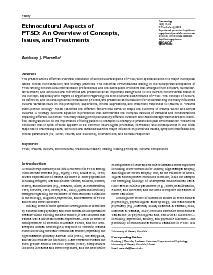Ethnocultural Aspects of PTSD: An Overview of Concepts, Issues, and Treatments
The present article offers an overview discussion of ethnocultural aspects of PTSD, with special attention to major conceptual issues, clinical considerations, and therapy practices. The historical circumstances leading to the widespread acceptance of PTSD among conventional mental health professionals, and the subsequent criticisms that emerged from scholars, humanitarian workers, and ethnocultural minorities are presented as an important background to the current controversial status of the concept, especially with regard to arguments regarding the ethnocultural determinants of PTSD. The concept of culture, its definition, and its developmental socialization process, are presented as foundations for understanding the many influences cultural variables have on the perception, experience, clinical expressions, and treatment responses to trauma. A “trauma event-person ecology” model identifies the different factors that serve to shape the outcome of trauma within and across cultures. A therapy outcome equation is presented that summarizes the complex calculus of variables and considerations impacting different outcomes. The many healing principles used by different Western and traditional approaches are also identified, calling attention to the importance of fitting patient to therapist to therapy to present and past circumstances. The article concludes that in spite of what appears to be common neurological processes, correlates, and consequences in the initial response to trauma exposure, ethnocultural variables exercise major influence on perceived causes, symptom manifestations, clinical parameters (i.e., onset, course, and outcome), interventions, and societal responses.
Geachte bezoeker,
De informatie die u nu opvraagt, kan door psychotraumanet niet aan u worden getoond. Dit kan verschillende redenen hebben,
waarvan (bescherming van het) auteursrecht de meeste voorkomende is. Wanneer het mogelijk is om u door te verwijzen naar de bron
van deze informatie, dan ziet u hier onder een link naar die plek.
Als er geen link staat, kunt u contact opnemen met de bibliotheek,
die u verder op weg kan helpen.
Met vriendelijke groet,
Het psychotraumanet-team.
In: Traumatology eISSN: 1085-9373 | 16 | 4 | 17-26
https://doi.org/10.1177/1534765610388062


